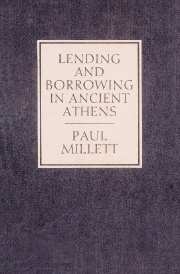Book contents
- Frontmatter
- Contents
- Preface
- I Approaches to lending and borrowing
- II The ideology of lending and borrowing
- III Borrowing and repayment
- IV The rôle of interest
- V Philia and friendship
- VI Non-professional lending: loans without interest
- VII Non-professional lending: loans bearing interest
- VIII Professional money-lending
- IX Conclusion
- Appendices
- Notes
- Bibliography
- Index of passages cited
- Index of papyri
- Index of inscriptions
- General index
III - Borrowing and repayment
Published online by Cambridge University Press: 20 August 2009
- Frontmatter
- Contents
- Preface
- I Approaches to lending and borrowing
- II The ideology of lending and borrowing
- III Borrowing and repayment
- IV The rôle of interest
- V Philia and friendship
- VI Non-professional lending: loans without interest
- VII Non-professional lending: loans bearing interest
- VIII Professional money-lending
- IX Conclusion
- Appendices
- Notes
- Bibliography
- Index of passages cited
- Index of papyri
- Index of inscriptions
- General index
Summary
THE INGRATITUDE OF NICOSTRATUS
A few years before his brush with Stephanus, as described in the previous chapter (see above, pp. 24–7), Apollodorus had involved himself in a law suit against his neighbour Nicostratus. The speech he delivered on that occasion is preserved as the fifty-third oration in the Demosthenic corpus. The ostensible purpose of Apollodorus' accusation was to establish that two slaves, whom Nicostratus and his brother Deinon were claiming as their own property, were in reality the property of a third brother, Arethusius. Because Arethusius was a state debtor – the result of a previous legal encounter with Apollodorus – his property was liable to seizure. According to Athenian practice, a successful prosecution against Nicostratus would have brought Apollodorus a reward of one third of the value of the slaves; but in his introduction to the speech (§§1–3), he renounces all rights to any reward. He claims instead that his true motive for bringing a charge against Nicostratus is a desire to be revenged on the brothers for the repeated injustices he has suffered at their hands. ApoUodorus' recital of these wrongs (§§4–13) provides a convenient introduction to the main characteristics of credit in fourth-century Athens as set out in this and the following chapters.
Apollodorus begins his account of the origins of the dispute by underlining the good relationship that had previously prevailed between himself and Nicostratus (§4):
Nicostratus, whom you see here in court, men of the jury, was a neighbour of mine in the country, and a man of my own age. […]
- Type
- Chapter
- Information
- Lending and Borrowing in Ancient Athens , pp. 53 - 90Publisher: Cambridge University PressPrint publication year: 1991

